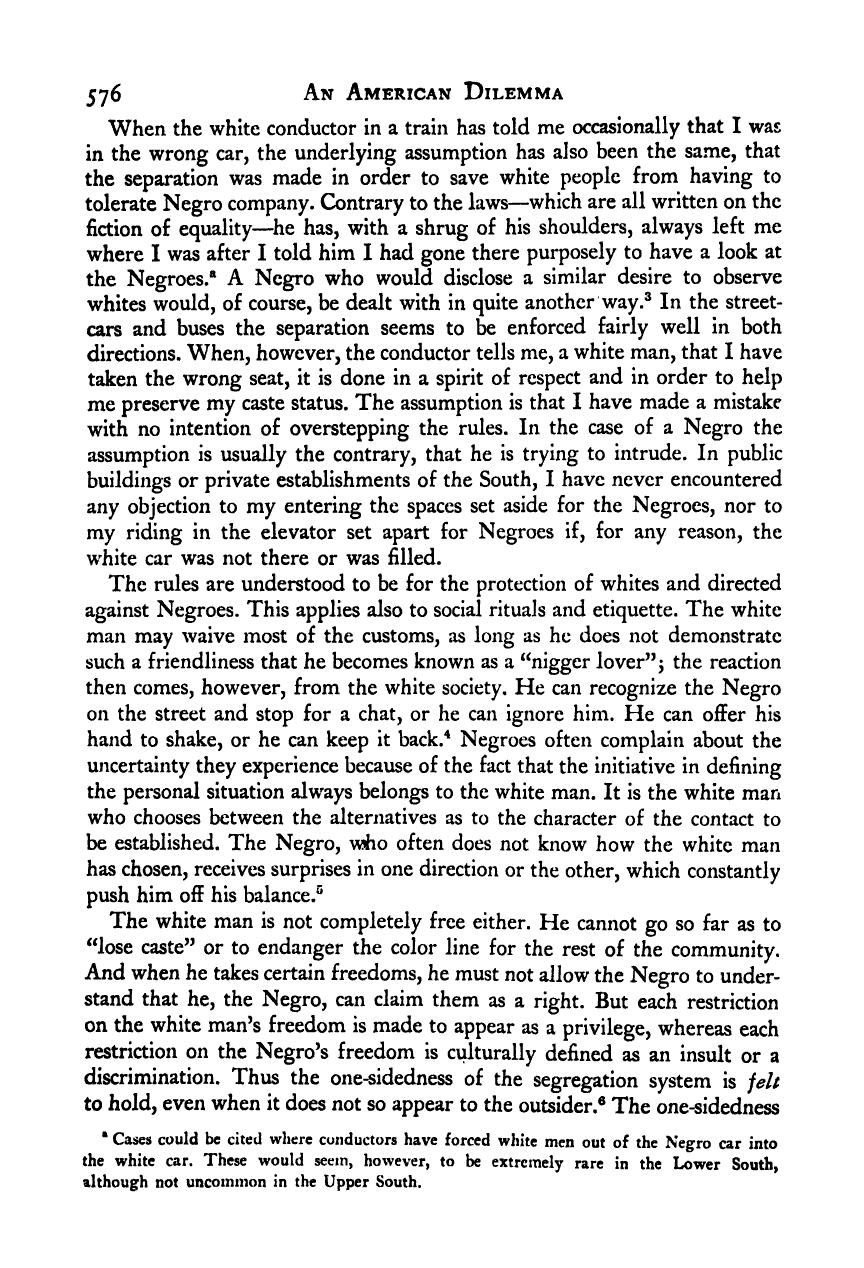Note: Gunnar Myrdal died in 1987, less than 70 years ago. Therefore, this work is protected by copyright, restricting your legal rights to reproduce it. However, you are welcome to view it on screen, as you do now. Read more about copyright.
Full resolution (TIFF) - On this page / på denna sida - VII. Social Inequality - 28. The Basis of Social Inequality - 2. The One-Sidedness of the System of Segregation

<< prev. page << föreg. sida << >> nästa sida >> next page >>
Below is the raw OCR text
from the above scanned image.
Do you see an error? Proofread the page now!
Här nedan syns maskintolkade texten från faksimilbilden ovan.
Ser du något fel? Korrekturläs sidan nu!
This page has never been proofread. / Denna sida har aldrig korrekturlästs.
576 An American Dilemma
When the white conductor in a train has told me occasionally that I was
in the wrong car, the underlying assumption has also been the same, that
the separation was made in order to save white people from having to
tolerate Negro company. Contrary to the laws—which are all written on the
fiction of equality—^he has, with a shrug of his shoulders, always left me
where I was after I told him I had gone there purposely to have a look at
the Negroes.® A Negro who would disclose a similar desire to observe
whites would, of course, be dealt with in quite another way.® In the street-
cars and buses the separation seems to be enforced fairly well in both
directions. When, however, the conductor tells me, a white man, that I have
taken the wrong seat, it is done in a spirit of respect and in order to help
me preserve my caste status. The assumption is that I have made a mistake
with no intention of overstepping the rules. In the case of a Negro the
assumption is usually the contrary, that he is trying to intrude. In public
buildings or private establishments of the South, I have never encountered
any objection to my entering the spaces set aside for the Negroes, nor to
my riding in the elevator set apart for Negroes if, for any reason, the
white car was not there or was filled.
The rules are understood to be for the protection of whites and directed
against Negroes. This applies also to social rituals and etiquette. The white
man may waive most of the customs, as long as he does not demonstrate
such a friendliness that he becomes known as a ^‘nigger lover” 5
the reaction
then comes, however, from the white society. He can recognize the Negro
on the street and stop for a chat, or he can Ignore him. He can offer his
hand to shake, or he can keep it back."* Negroes often complain about the
uncertainty they experience because of the fact that the initiative in defining
the personal situation always belongs to the white man. It is the white man
who chooses between the alternatives as to the character of the contact to
be established. The Negro, who often does not know how the white man
has chosen, receives surprises in one direction or the other, which constantly
push him off his balance.^
The white man is not completely free either. He cannot go so far as to
<4ose caste” or to endanger the color line for the rest of the community.
And when he takes certain freedoms, he must not allow the Negro to under-
stand that he, the Negro, can claim them as a right. But each restriction
on the white man’s freedom is made to appear as a privilege, whereas each
restriction on the Negro’s freedom is culturally defined as an insult or a
discrimination. Thus the one-sidedness of the segregation system is feh
to hold, even when it does not so appear to the outsider.® The one-sidedness
• Cases could be cited where conductors have forced white men out of the Negro car into
the white car. These would seem, however, to be extremely rare in the Lower South,
although not uncommon in the Upper South.
<< prev. page << föreg. sida << >> nästa sida >> next page >>